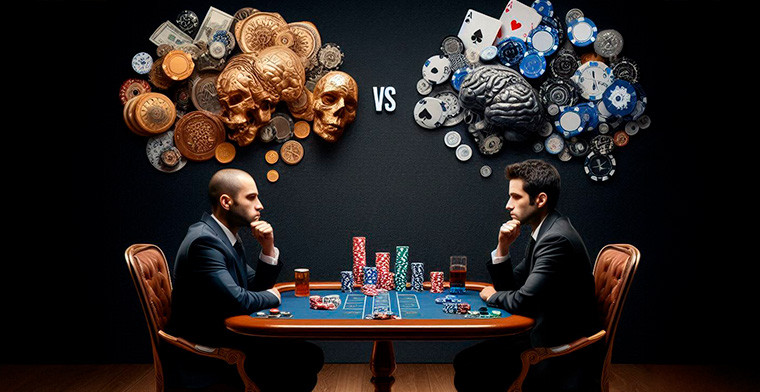
Interviews
Poker and controversy: Mind Sport or Game of Chance? The debate explained
2 minutos de lectura
(Buenos Aires, SoloAzar Exclusive).- Poker managed to win its most difficult game: being considered a mind sport by IMSA after years of struggle. However, the debate remains open among those who still consider it a game of chance. This article analyzes the arguments in favor of the fact that poker can be recognized as a mental sport and reviews the history of this card game that was born in the Middle Ages and has become a passion of multitudes.

A brief history of Poker: From its Origins to the Era of Online Poker
Poker attracts millions of fans around the world and has a fascinating history that spans centuries. This card game, which mixes strategy, skill and a touch of luck, evolved and became popular from its humble beginnings to become a global phenomenon thanks to online poker.
Now, although there is controversy among historians about the roots of poker, they all agree that it dates back to the 16th century. Furthermore, they point to the Persian game called As Nas as its precursor, which was played with 25 cards and five suits. Later on, Persian traders introduced it to Europe, where it was mixed with other games such as the French Poque.
This way, Poque, played in 18th century France is the direct predecessor of modern poker. This game crossed the Atlantic with French traders who settled in New Orleans, United States. As it expanded along the Mississippi River, the rules began to become more complex, adapting to local preferences. Little by little it grew in popularity thanks to its association with the saloons of the Old West and the steamboats of the Mississippi, where players bet on intense games in which they often risked their lives.
The 20th Century: from Professionalization to Online Poker
The 20th century was the era of poker professionalization. First, the introduction of Texas Hold'em in the Roaring Twenties revolutionized the game with its combination of strategy and simplicity. Then, in the revolutionary sixties, Las Vegas became the mecca of poker and in 1970 it gained its professional status with the first World Series of Poker (WSOP) tournament, setting a precedent in the history of that game.
However, in the nineties everything changed with the birth of online poker. The arrival of digital platforms towards the end of that decade allowed players to enjoy games from the comfort of their homes. Then, in 2003, online poker exploded thanks to Chris Moneymaker's victory at the WSOP. Moneymaker, an amateur player who qualified through an online tournament and proved that anyone could win. Today, millions of people play poker online, both recreationally and professionally.
Is Poker a Mind Sport or a Game of Chance?
The International Mind Sports Association (IMSA) established that poker is a mental sport, which is undoubtedly a triumph for the associations linked to poker that have been claiming this status for years. The same organizations that now dream of seeing poker become an Olympic sport.
However, the controversy over whether poker is a mental sport or a game of chance will likely continue. Although evidence supports that while luck plays a role in the short term, it is skill that defines success in the long term.
Poker as a Game of Chance
Now, those who continue to think of poker as a game of chance argue that luck ends up being too important to succeed in this game. Thus, according to this position, the Dependency of the Cards and the weight of random and Uncontrollable Elements ends up being decisive Even for the most experienced players.
Poker as a Mind Sport
On the other side of the table, those who agree with the IMSA understand that poker is a mental sport because they put all the weight of victory on the ability of the players who must make strategic decisions, control their emotions, remain calm. under pressure, make a keen read of opponents and predict moves that require a high level of concentration and observation. Furthermore, they argue that players must improve day by day as in any other mental sport such as Chess.
End of the game
As we saw in this article, from its roots in Persian card games to today's online tournaments, poker has captured generations and has been perfected and demanding more and more from its competitors. With its unique mix of strategy, skill and emotion, it was finally accepted as a mind sport and now dreams of becoming an Olympic sport.
Categories: Poker
Tags: Poker,
Region: Europa
Sign Up
To subscribe to our newsletter, please fill in your details
Receive all the latest content in your email several times a month.





